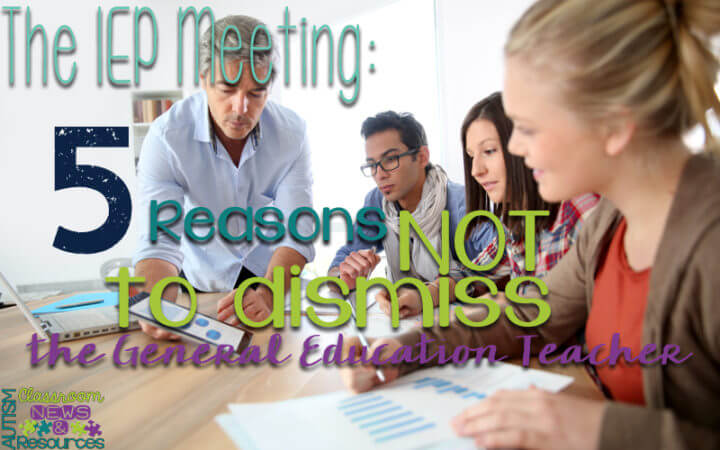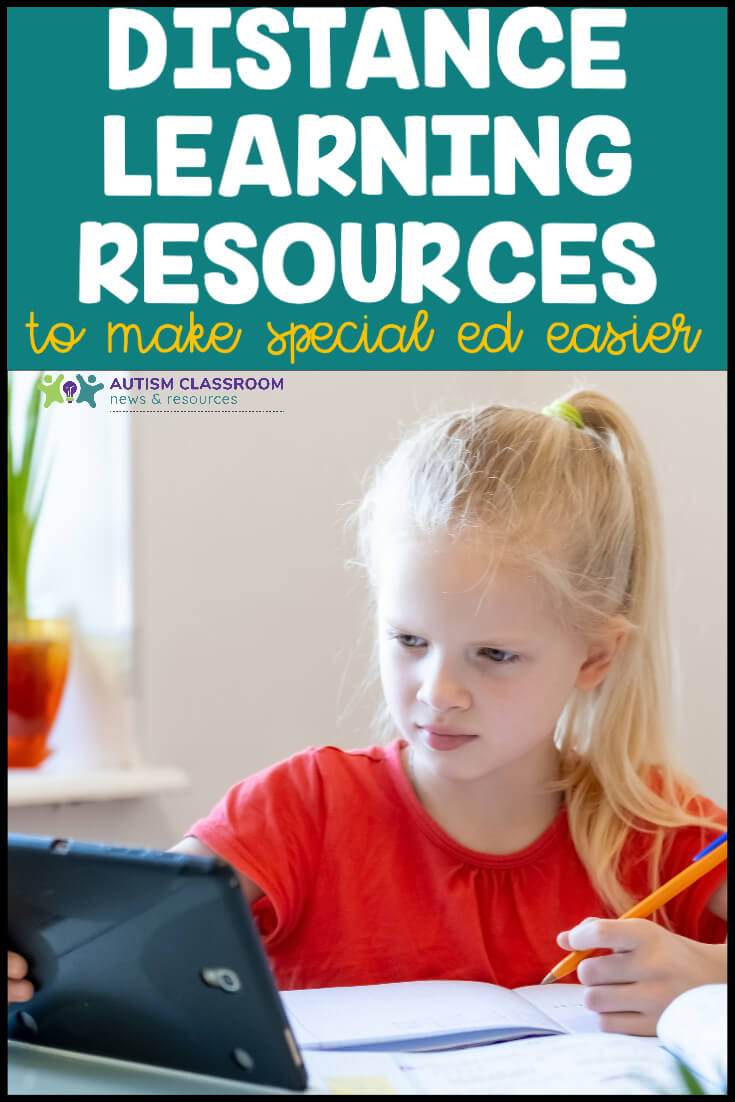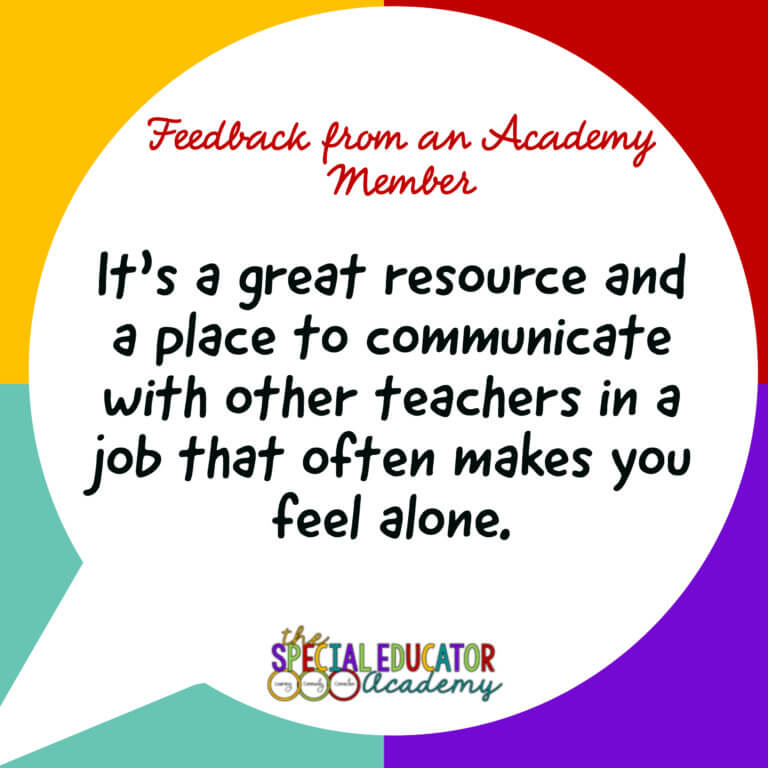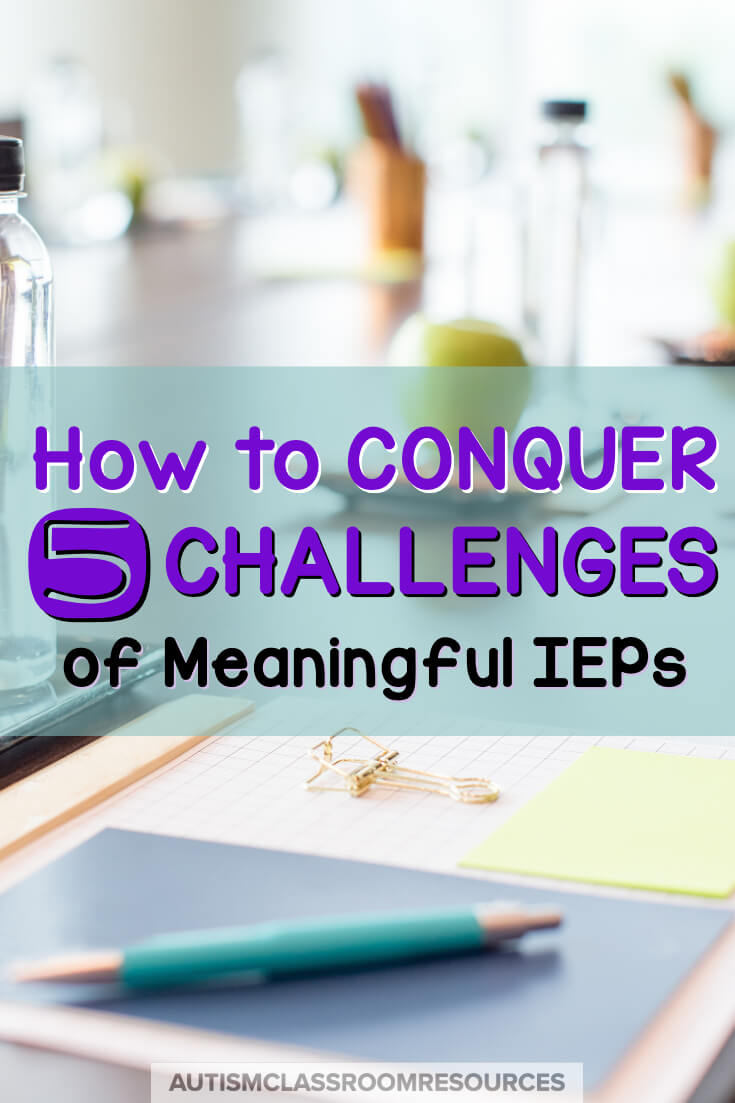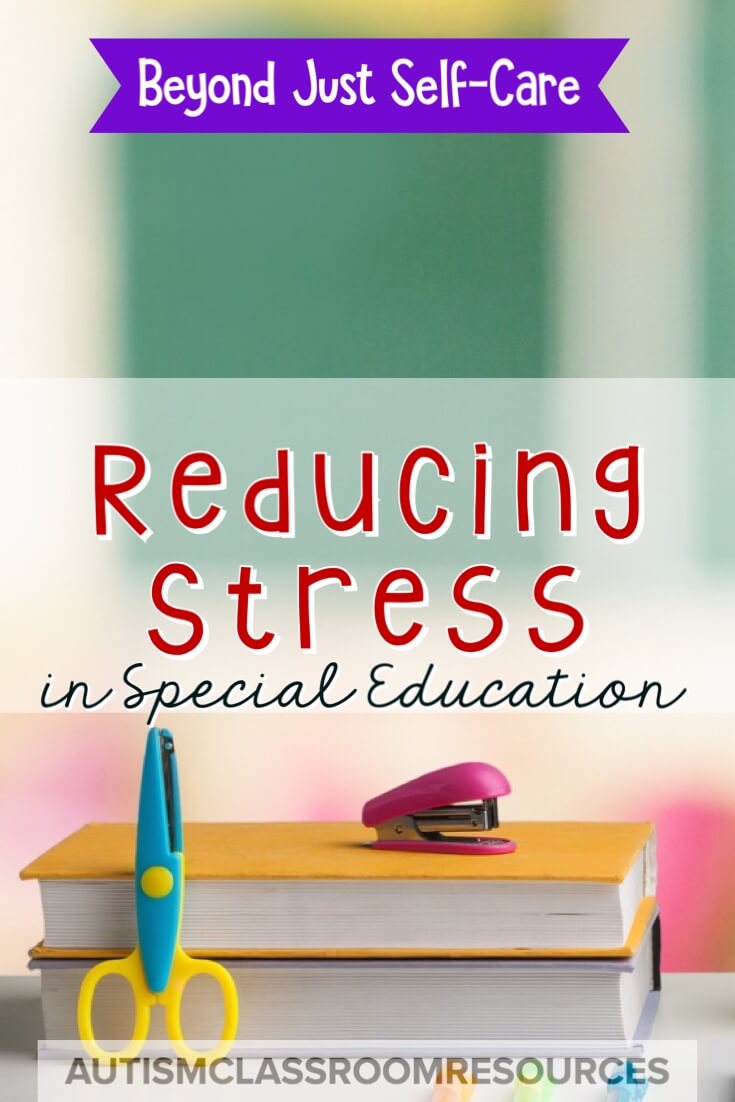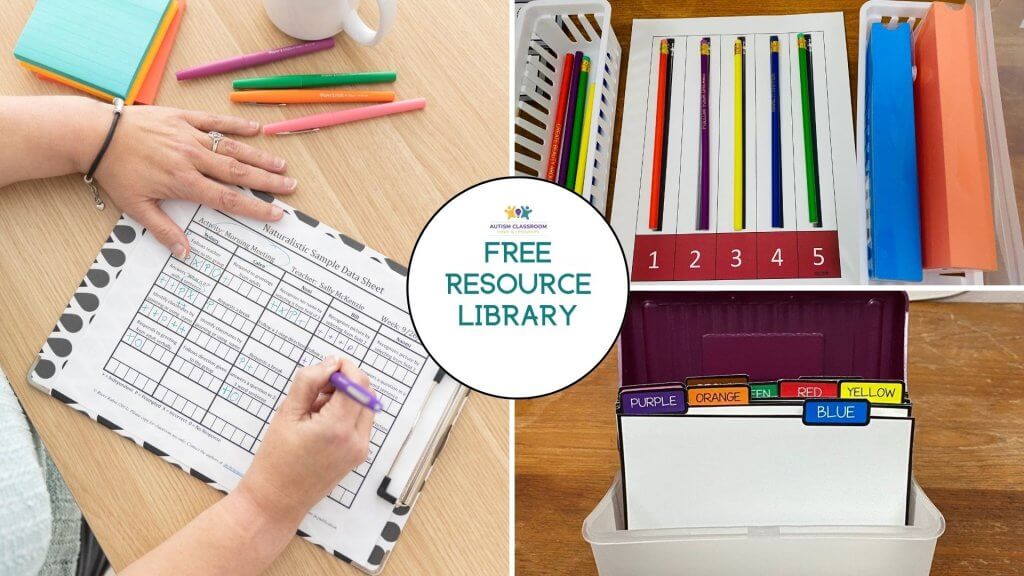Sharing is caring!
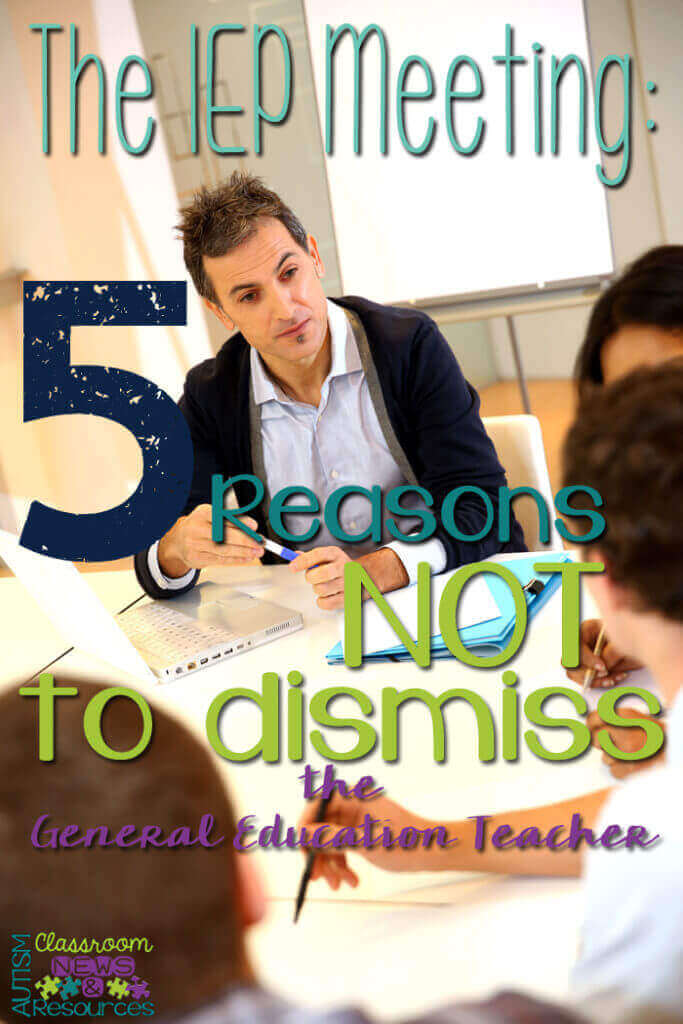
Have you ever wondered about the role of the general education teacher in an IEP meeting for students with significant disabilities? I have sat through more IEPs than I would like to count over the years for all sorts of students. We all know that the general education staff is required to be part of the IEP team.
Sometimes the general education teacher fits seamlessly into the team and everyone is comfortable with it. But often, general education teachers struggle with what their role is and what they are expected to contribute. Or the general educator has lots to contribute but the team doesn’t provide the opportunity. Or even worse, the whole team feels that there is not a need for feedback from the general educator because the student is primarily self-contained. So, today I want to talk about 5 ways that the general education staff can and should contribute to the IEP team process.
Chances are good if a general education teacher has had limited experience, and probably even less formal training, their role in the meeting may not always be particularly clear for them. For students who are full-time or close to full time in general education, it is fairly easy to see what the role should be. However for students who spend limited time in a general education classroom, what do we expect of the general educator?
I asked that same question for quite a number of years at the beginning of my career. However, over the years it became increasingly apparent to me why the general education teacher needs to be on the IEP team. And we, as special educators, need to work to prepare them to actively participate (not dismiss them) from the meeting. Depending on the student, there are tons of things that the general educator can contribute to the IEP, but I am going to focus on 5 things that they bring to the team that other participants may not.
1. Knowledge of the Curriculum
Self-contained teachers often feel planning meetings is difficult with students from multiple grades. However, thinking about how the student is performing in relation to that grade level curriculum is important. Do we know that many of our students are not on grade level? Of course…that’s special education. However, it is critical to talk about what the curriculum expects throughout the day and what is expected of the students when prioritizing academic skills and making decisions about instruction. It’s also an important reference for families to understand.
2. Social Opportunities During the Day
Our students benefit from opportunities to interact with their same age peers both to learn social skills and just for fun. The initial approach is often for them to go lunch and recess. However, for many of our students with autism, those are really difficult times for them to learn because the settings are large and loud.
For many students they will do better when given something structured to do. This is especially true if it’s something they can excel at. Having the student come in during center time might be easier to pull peers for interaction.
For instance, I’ve had kids who bring adapted books into the classroom and the peers and students with disabilities read together. That requires a time that the students aren’t engaged in direct instruction. The general educator is the person who knows what the day looks like. Typically she knows at both her own grade and the next grade up. She knows how the classes are structured and what opportunities are available within the day. This is important to know when planning. You are not going to create the student’s whole schedule in the meeting. But, you are going to want to think about how the skills will eventually be addressed.
3. Behavioral Expectations
The general education teacher is the one who knows what the typical second graders (or any graders) look like. How long are they expected and able to sit in a group activity? How much new information can they take in and be expected to retain? This is important because it’s helpful to know what you are aiming for in teaching the student with the IEP. You always want to be teaching to the next environment. So what are the realistic expectations for a student at this age? They can also share this with the team who may have unrealistic expectations for their child. For instance, no kindergartener can sit for 45 minutes in a group activity, particularly at the beginning of the year. So we shouldn’t expect a kindergartener with special needs to do so either.
4. Instructional Expertise
For many of our students there may be instructional expertise in a subject that the general educator brings to the table. For instance, I was so excited to sit in an IEP meeting once with a student learning fractions. Her special education teacher (the generalist of all areas and ages) knew how to teach math. But she was stuck with this level of math. She wasn’t sure how to present it in different ways that this student could learn. The general education teacher was able to describe how students learn fractions. And he shared multiple ways we could demonstrate and teach them so that they would make sense for the student.
He was a huge asset for both the teacher and the IEP team in writing this student’s math goal. So seek out that expertise, recognize it and ask them to share. Special educators are typically teaching up to 6 grade levels at a time. Being a master of every single skill is difficult. The teachers who are specializing in their grade level are able to go deeper into the instructional content. Ask them to share that with the team.
5. Who are Good Peer Buddies / Friends for the Student?
The general educator is also the person who is going to best be able to suggest friends for parties and peers for socialization opportunities. They will know who would be both good friends and those that would be good models. They know the student with special needs and the students in their classrooms. So they can help figure out who the good pairs will be. This can be critical in thinking about how to integrate more social opportunities into their day.
These 5 reasons don’t even include that the general educator can report on how the student is doing in his/her classroom when they are there. Often the student goes independently, and if not independently with a paraprofessional. The general education teacher is “in charge” of the student during that time. They need to share their observations about the student’s learning in a meaningful way.
So, next time, before you talk to the team about dismissing the general ed. teacher, ask yourself what that teacher can contribute to the discussion? Think about meeting with the general education teacher to prepare him/her for the meeting. If they don’t attend meetings regularly, they may not know what they are supposed to say. And they may think there are things they aren’t supposed to say. That may make them sit quietly and say nothing. Talk with them about areas of information they can share and encourage them to participate. If they have concerns about the child in the classroom, talk about how those can be presented to the team in a way that is constructive.
Even when students don't spend much time in gen ed, those teachers have something to contribute. Click to TweetAnd if you need a little comic relief to get through the IEP process, you might enjoy the social story I wrote about IEP teams a while back. Sometimes it helps to start with a good look at why we are there. Keeping the IEP meeting functional is critical.
Until next time,


